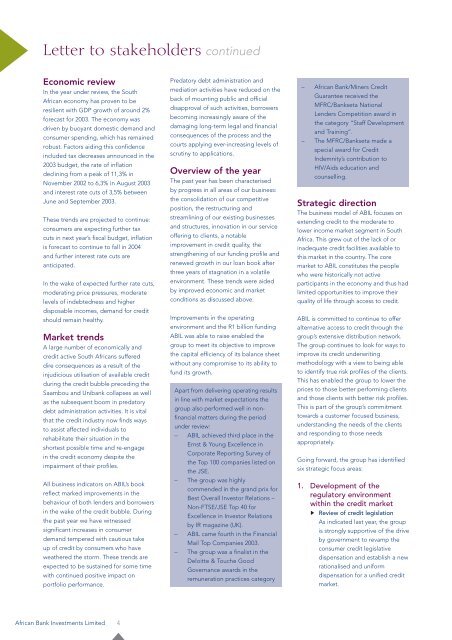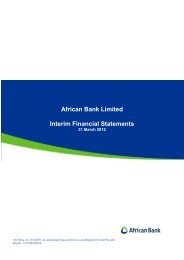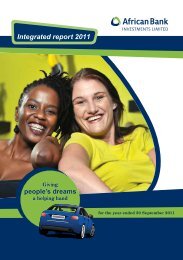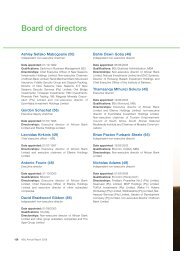Download - African Bank
Download - African Bank
Download - African Bank
You also want an ePaper? Increase the reach of your titles
YUMPU automatically turns print PDFs into web optimized ePapers that Google loves.
Letter to stakeholders continued<br />
Economic review<br />
In the year under review, the South<br />
<strong>African</strong> economy has proven to be<br />
resilient with GDP growth of around 2%<br />
forecast for 2003. The economy was<br />
driven by buoyant domestic demand and<br />
consumer spending, which has remained<br />
robust. Factors aiding this confidence<br />
included tax decreases announced in the<br />
2003 budget, the rate of inflation<br />
declining from a peak of 11,3% in<br />
November 2002 to 6,3% in August 2003<br />
and interest rate cuts of 3,5% between<br />
June and September 2003.<br />
These trends are projected to continue:<br />
consumers are expecting further tax<br />
cuts in next year’s fiscal budget, inflation<br />
is forecast to continue to fall in 2004<br />
and further interest rate cuts are<br />
anticipated.<br />
In the wake of expected further rate cuts,<br />
moderating price pressures, moderate<br />
levels of indebtedness and higher<br />
disposable incomes, demand for credit<br />
should remain healthy.<br />
Market trends<br />
A large number of economically and<br />
credit active South <strong>African</strong>s suffered<br />
dire consequences as a result of the<br />
injudicious utilisation of available credit<br />
during the credit bubble preceding the<br />
Saambou and Unibank collapses as well<br />
as the subsequent boom in predatory<br />
debt administration activities. It is vital<br />
that the credit industry now finds ways<br />
to assist affected individuals to<br />
rehabilitate their situation in the<br />
shortest possible time and re-engage<br />
in the credit economy despite the<br />
impairment of their profiles.<br />
All business indicators on ABIL’s book<br />
reflect marked improvements in the<br />
behaviour of both lenders and borrowers<br />
in the wake of the credit bubble. During<br />
the past year we have witnessed<br />
significant increases in consumer<br />
demand tempered with cautious take<br />
up of credit by consumers who have<br />
weathered the storm. These trends are<br />
expected to be sustained for some time<br />
with continued positive impact on<br />
portfolio performance.<br />
<strong>African</strong> <strong>Bank</strong> Investments Limited 4<br />
Predatory debt administration and<br />
mediation activities have reduced on the<br />
back of mounting public and official<br />
disapproval of such activities, borrowers<br />
becoming increasingly aware of the<br />
damaging long-term legal and financial<br />
consequences of the process and the<br />
courts applying ever-increasing levels of<br />
scrutiny to applications.<br />
Overview of the year<br />
The past year has been characterised<br />
by progress in all areas of our business:<br />
the consolidation of our competitive<br />
position, the restructuring and<br />
streamlining of our existing businesses<br />
and structures, innovation in our service<br />
offering to clients, a notable<br />
improvement in credit quality, the<br />
strengthening of our funding profile and<br />
renewed growth in our loan book after<br />
three years of stagnation in a volatile<br />
environment. These trends were aided<br />
by improved economic and market<br />
conditions as discussed above.<br />
Improvements in the operating<br />
environment and the R1 billion funding<br />
ABIL was able to raise enabled the<br />
group to meet its objective to improve<br />
the capital efficiency of its balance sheet<br />
without any compromise to its ability to<br />
fund its growth.<br />
Apart from delivering operating results<br />
in line with market expectations the<br />
group also performed well in nonfinancial<br />
matters during the period<br />
under review:<br />
– ABIL achieved third place in the<br />
Ernst & Young Excellence in<br />
Corporate Reporting Survey of<br />
the Top 100 companies listed on<br />
the JSE.<br />
– The group was highly<br />
commended in the grand prix for<br />
Best Overall Investor Relations –<br />
Non-FTSE/JSE Top 40 for<br />
Excellence in Investor Relations<br />
by IR magazine (UK).<br />
– ABIL came fourth in the Financial<br />
Mail Top Companies 2003.<br />
– The group was a finalist in the<br />
Deloitte & Touche Good<br />
Governance awards in the<br />
remuneration practices category<br />
– <strong>African</strong> <strong>Bank</strong>/Miners Credit<br />
Guarantee received the<br />
MFRC/<strong>Bank</strong>seta National<br />
Lenders Competition award in<br />
the category “Staff Development<br />
and Training”.<br />
– The MFRC/<strong>Bank</strong>seta made a<br />
special award for Credit<br />
Indemnity’s contribution to<br />
HIV/Aids education and<br />
counselling.<br />
Strategic direction<br />
The business model of ABIL focuses on<br />
extending credit to the moderate to<br />
lower income market segment in South<br />
Africa. This grew out of the lack of or<br />
inadequate credit facilities available to<br />
this market in the country. The core<br />
market to ABIL constitutes the people<br />
who were historically not active<br />
participants in the economy and thus had<br />
limited opportunities to improve their<br />
quality of life through access to credit.<br />
ABIL is committed to continue to offer<br />
alternative access to credit through the<br />
group’s extensive distribution network.<br />
The group continues to look for ways to<br />
improve its credit underwriting<br />
methodology with a view to being able<br />
to identify true risk profiles of the clients.<br />
This has enabled the group to lower the<br />
prices to those better performing clients<br />
and those clients with better risk profiles.<br />
This is part of the group’s commitment<br />
towards a customer focused business,<br />
understanding the needs of the clients<br />
and responding to those needs<br />
appropriately.<br />
Going forward, the group has identified<br />
six strategic focus areas:<br />
1. Development of the<br />
regulatory environment<br />
within the credit market<br />
Review of credit legislation<br />
As indicated last year, the group<br />
is strongly supportive of the drive<br />
by government to revamp the<br />
consumer credit legislative<br />
dispensation and establish a new<br />
rationalised and uniform<br />
dispensation for a unified credit<br />
market.







